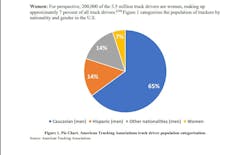Women underscore ongoing harassment, driver training problems in trucking
Sexual harassment, assault, and even rape remain all-too-common occurrences that continue to plague women who work in trucking—particularly drivers. It’s a problem that weighs heavily on the minds of many women in the industry and one that dominated discussion during the inaugural meeting of the Federal Motor Carrier Safety Administration’s Women of Trucking Advisory Board on Nov. 9.
Board members, who represent a mix of trucking companies, nonprofit associations, independent owner-operators, and other trucking business associations, stressed the need for enforcement guidelines for commercial truck driver trainers and are calling on FMCSA to provide guidance for and hold motor carriers accountable for violence against women in trucking.
One standard, according to board member Kellylynn McLaughlin, a professional driver for Prime Transport, would be to abolish sleeper sharing altogether for over-the-road driver training—mixed gender or not.
“One thing we could introduce into the training environment is a mutual expectations guideline that is agreed upon before the training in the vehicle commences,” McLaughlin said. “Both the trainer and the trainee agree on what is appropriate behavior and how that training is going to move forward. Then, there is a neutral party if, in fact, there is a situation that is harassment or bullying, that either party can go to air their grievances and get help resolving the issue.”
See also: Women speak up about harassment in trucking
When it comes to addressing some of those ethical decisions that are made, Enjoli DeGrasse, deputy director of labor for the International Brotherhood of Teamsters, suggested that similar to the industry’s entry-level driver training requirements, an ethics rulemaking is needed across the board in trucking.
“It’s a public health issue and occupational health issue,” DeGrasse said. “A regulation would put the onus on employers to train their employees on this.”
DeGrasse also proposed training requirements for fleet and safety managers, supervisors, and other employees, including drivers, as well as education for service station and truck stop workers so they know how to identify a potentially harmful situation and provide driver-support services at their locations.
FMCSA conducted a survey, Crime Prevention for Truckers, to better understand the nature and prevalence of harassment and assaults against truckers, specifically women and minorities. The report details harassment, threats of harm, or actual physical harm perpetrated against truckers, their possessions, vehicles, or cargo.
The survey found that female truck drivers are exposed to more sexual harassment at their companies or by their trainers than their male counterparts. In addition, roughly half of the harassment incidents go unreported due to concerns that reporting the incident would not make a difference.The Women of Trucking Advisory Board will use the results of this survey and other data, as well as the firsthand experience of its 16 women members, to make recommendations and discuss the next steps regarding the findings on harassment, assaults, and crimes being committed against women truckers.
The critical role carriers play
An ongoing problem is there are not enough female trainers in the industry. Laura Duryea, a manager of recruiting, retention, and driver development at Boyle Transportation, said the industry needs to do better when it comes to making training and mentoring positions more appealing for women.
“I think that a lot of female drivers don’t feel they are qualified to train, and maybe that’s one of the reasons why we don’t have more female trainers,” Duryea said. “I’ve done training within my organization, and female brains work differently, so you have to train differently. The way you communicate with a female driver is going to be different than how you communicate with or train a male driver.”
Duryea stressed the importance of demonstrating patience and giving both trainers and trainees the resources they need to absorb important information.
A couple years ago, Prime Inc. hired a female liaison to help drivers and trainers through the orientation process and beyond, according to Emily Plummer, a professional driver with Prime, which ranks No. 21 on the FleetOwner 500: Top For-Hire Fleets of 2022 list. During driver orientations, the liaison hands out documents on best practices for protection and success. The liaison also is available to drivers by phone or email 24/7 should a problem arise, Plummer added.
“As far as training at Prime, women can decide if they want to be trained by a female or if they want to be trained by a male,” Plummer said. “We also do have a group of individuals who are training trans drivers. We have groups here where people can decide who they want to stay with because they feel safer together.”
Prime also took ensuring drivers feel safe a step further by installing panic buttons in its trucks. Because of the actions that Prime has taken over the last few years, retention of female drivers has increased.
“If we push the panic button in our truck, our cellphone rings immediately and our Qualcomm goes off,” Plummer said. “If we don’t answer within two minutes, the police, ambulance, and/or fire are dispatched to our location.”
In addition to sharing best practices from the carriers doing it right, Nicole Ward, co-owner of the nonprofit African American Women in Trucking Association, added that its equally important to highlight the companies and organizations that fail to support women.
“From a recruiting standpoint, the [bad] trainers in the industry have the ability to go from company to company—that’s a problem,” explained Jerri Banks, owner of Life on the Road Recruiting and Transportation Services. “We report things like abandonment, and we know when a driver has done something really bad at one company, so we won’t bring them in to another company. That is really important when it is brought to light, so the next company won’t hire that person.”
“Change starts from the top,” Banks added. “FMCSA is doing everything it can to incorporate this change, and we want to push this change. The industry took a really big stance on human trafficking. We have to take the same stance on sexual assault in trucking.”
Using FMCSA to hold bad actors accountable
One way the industry could take that strong stance against violence, according to Sharae Moore, founder and president of the SHE Trucking Foundation, is using the federal Drug & Alcohol Clearinghouse as a platform to eliminate those who pose a danger to others in the industry.
Moore also stressed the importance of the federal government regulating driver trainer requirements.
“We need a standard training requirement program put in place, so trainers know what the expectation is,” Moore said. “We need good teachers. We need to actually incorporate a manual that is one voice for trainers. A lot of things are being missed in training, and we can incorporate these harassment policies as well and cover a lot of groundwork right from the beginning.”
Boyle Transportation’s Duryea agreed on using the clearinghouse for multiple purposes and “having sexual assault be part of that,” she said.
Banks, who also works closely with Moore and SHE Trucking, suggested publicizing offenders on FMCSA’s imminent hazard listings.
“In order to be on those lists, it has to be reported and the person convicted, which goes back to training,” noted Anne Balay, organizer with the Service Employees International Union. “We need to think of a system that makes reporting safe and supportive. If someone reports rape or harassment, do we have therapy and support? We need to really think about the culture that we work in.”
McLaughlin called on FMCSA to possibly create an app or a hotline that could be used to report harassment or violence in trucking.
“We need a quick response from FMCSA on what their parameters are for authority, because we can have a lot of great discussion, but we need to know,” McLaughlin said. “What can we come out with from this group that will really make an impact? Can we put out best practices and hold carriers to those standards? Can we hold our customers accountable to those standards? Can we create an app and a hotline, so every driver has a way to report issues of harassment and rape without going through the company? Can we create a working group to put in place a support network?”
Kala Wright, director of external affairs at FMCSA, said the agency can use its scope to the maximum, but it would also continue partnering with agencies like the Department of Labor, depending on what the issue is and who holds the jurisdiction.
“The benefit is government is vast and there are opportunities to partner with other agencies that may be able to push further in the jurisdiction we are looking for,” Wright explained. “I do think that is a worthy exercise for us to look at where our jurisdiction ends, who has the authority in this area, and how can we partner with them to achieve these results? Even if FMCSA has limitations, we can look to the larger government moving forward.”
Ultimately, according to Shannon Watson, a senior adviser with FMCSA, the Women of Trucking Advisory Board has been given the charge from Congress to set those parameters and develop some of the ideas and best practices that the agency will explore under its scope of authority.
About the Author

Cristina Commendatore
Cristina Commendatore is a past FleetOwner editor-in-chief. She wrote for the publication from 2015 to 2023.

